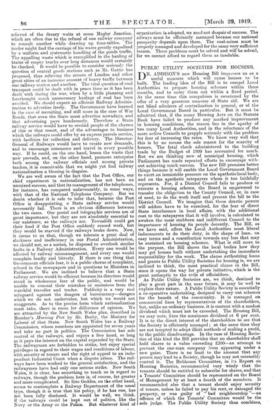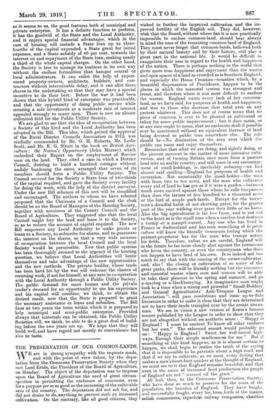PUBLIC UTILITY SOCIETIES FOR HOUSING.
TAR. ADDISQN'S new Housing Bill impresses us as a .1-1 useful measure which will cause houses to be built. The leading idea of the Bill is to compel Local Authorities to prepare housing schemes within three months, and to carry them out within a fixed period. At the same time this compulsion is sweetened by the offer of a very generous measure of State aid. We are not blind admirers of centralization in general, or of the Local Government Board in particular. But it must be admitted that, if the many Housing Acts on the Statute Book have failed to produce any marked improvement in housing conditions, the reason lies in the apathy of too many Local Authorities, and in the reluctance of the more active Councils to grapple seriously with the problem for fear of increasing the rates. We know very well that this is by no means the sole reason for the scarcity of houses. The fatal check administered to the building trade by the Budget of 1909 has accounted for much. But we are thinking now of municipal housing, which Parliament has made repeated efforts to encourage with- out achieving much success. The new Bill promises better things because it will enable the Local Government Board to exert an irresistible pressure on the apathetic local body, and on the apathetic ratepayers whom it too faithfully represents. For, if a District Council fails to produce or execute a housing scheme, the Board is empowered to transfer the obligation to the County Council, or, in case of need, to do the work itself and present the bill to the District Council. We imagine that these drastic powers will seldom have to be exercised, for the fear of direct State interference in local affairs, with the additional cost to the ratepayers that it will involve, is calculated to awaken the most stubborn and indifferent Council to the importance of housing its people decently. The Bill, as we have said, offers the Local Authorities most liberal inducements to do their duty, in the shape of loam. on easy terms and a contribution towards any loss that may be sustained on housing schemes. What is still more to the purpose, the Bill shows the local bodies how they may get houses built without undertaking the immediate responsibility for the work. The clause authorizing loans and grants to Public Utility Societies for housing is, we are inclined to think, the most practical clause in the Bill, since it opens the way for private initiative, which is the great antiseptic to the evils of officialdom. As Public Utility Societies are, we think, destined to play a great part in the near future, it may be well to explain their nature. A Public Utility Society is essentially a co-operative undertaking, designed to carry out schemes for the benefit of the community. It is managed on commercial lines by representatives of the shareholders, but, unlike an ordinary business, it is content with a modest dividend which must not be exceeded. The Housing Bill, we may note, fixes the maximum dividend at 6 per cent. It is to the direct interest of the shareholders to see that the Society is efficiently managed ; at the same time they are not tempted to adopt illicit methods of making a profit, to the public disadvantage. In the case of Housing Socie- ties of this kind the Bill provides that no shareholder shall hold shares to a value exceeding £200--an attempt to prevent the one-man company from appearing under a new guise. There is no limit to the amount that any person may lend to a Society, though he may not ostensibly control it. The Hobhouse Committee, in its Report on Housing Societies, recommended very wisely that the tenants should be entitled to subscribe for shares, and that a Tenants' Committee should be represented on the Board of Management by at least a fourth of the members. It recommended also that a tenant should enjoy security of tenure, unless he failed to pay his rent, or damaged the property, or was guilty of " bad neighbourship "—an offence of which the Tenants' Committee would be the sole judge. The Public Utility Society thus combines,
as it seems to us, the good features both of municipal and private enterprise. It has a definite function to perform, it has the goodwill of the State and the Local Authority, and it enjoys special financial advantages, which in the case of housing will include a State loan up to three- fourths of the capital expended, a State grant for initial expenses, and a State subsidy of 40 per cent. towards the interest on and repayment of the State loan, making nearly a third of the whole capital charges. On the other hand, the Society is free to manage its business in its own way without the endless formalities that hamper central or local administrators. It can enlist the help of experi- enced property-owners, architects, builders, and con- tractors without interminable delay, and it can allot them shares in the undertaking so that they may have a special incentive to do their best. Before the war it had been shown that this hybrid kind of enterprise was practicable, and that the opportunity of doing public service while securing a safe investment at a moderate rate of interest appealed strongly to many men. There is now an almost unlimited field for the Public Utility Society.
We are glad to see that the idea of co-operation between a Society of this kind and the Local Authority has been adopted in the Bill. This idea, which gained the approval of the Rural District Councils Association in 1913, was cordially commended by Mr. G. H. Roberts, Mr. Leslie Scott, and Mr. E. G. Strutt in the book on British Agri- culture : the Nation's Opportunity (John Murray) which embodied their Report on the employment of Service men on the land. They cited a case in which a District Council, desiring to build a hundred cottages without unduly burdening the rates, arranged that seven of its members should form a Public Utility Society. The Council secured for the Society a State loan of two-thirds of the capital required, and gave the Society every facility for doing the work, with the help of the district surveyor. Under the new Bill schemes of this sort will be simplified and encouraged. The authors to whom we have referred proposed that the Chairman of a Council and the clerk should be on the Board of Managers of the Housing Society, together with nominees of the County Council and the Board of Agriculture. They suggested also that the local Council might buy the land and lease it to the Society, so as to reduce the amount of capital required. The new Bill empowers any Local Authority to make grants or loans to a Society, to subscribe for shares, and to guarantee the interest on the shares, so that a very wide measure of co-operation between the local Council and the local Society would be permissible. Now that public opinion has been thoroughly aroused to the urgency of the housing question, we believe that Local Authorities will bestir themselves and take advantage of the new opportunities and the new methods. The private builder, whose trade has been hard hit by the war will welcome the chance of resuming work, if not for himself, at any rate in co-operation with the Local Authority through a Public Utility Society. The public demand for more houses and the private trader's demand for an opportunity to use his experience and his capital will combine, we think, to obtain the desired result, now that the State is prepared to grant the necessary assistance in loans and subsidies. The Bill fixes at two years the term within which it is prepared to help municipal and semi-public enterprise. Provided always that materials can be obtained, the Public Utility Societies will, we think, be able to do a great deal of build- ing before the two years are up. We hope that they will build well, and have regard not merely to convenience but also to taste.



































 Previous page
Previous page